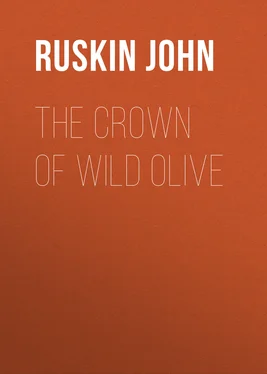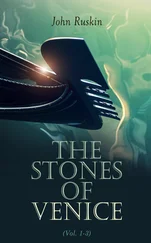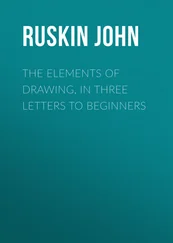John Ruskin - The Crown of Wild Olive
Здесь есть возможность читать онлайн «John Ruskin - The Crown of Wild Olive» — ознакомительный отрывок электронной книги совершенно бесплатно, а после прочтения отрывка купить полную версию. В некоторых случаях можно слушать аудио, скачать через торрент в формате fb2 и присутствует краткое содержание. Жанр: foreign_antique, foreign_home, literature_19, visual_arts, на английском языке. Описание произведения, (предисловие) а так же отзывы посетителей доступны на портале библиотеки ЛибКат.
- Название:The Crown of Wild Olive
- Автор:
- Жанр:
- Год:неизвестен
- ISBN:нет данных
- Рейтинг книги:4 / 5. Голосов: 1
-
Избранное:Добавить в избранное
- Отзывы:
-
Ваша оценка:
- 80
- 1
- 2
- 3
- 4
- 5
The Crown of Wild Olive: краткое содержание, описание и аннотация
Предлагаем к чтению аннотацию, описание, краткое содержание или предисловие (зависит от того, что написал сам автор книги «The Crown of Wild Olive»). Если вы не нашли необходимую информацию о книге — напишите в комментариях, мы постараемся отыскать её.
The Crown of Wild Olive — читать онлайн ознакомительный отрывок
Ниже представлен текст книги, разбитый по страницам. Система сохранения места последней прочитанной страницы, позволяет с удобством читать онлайн бесплатно книгу «The Crown of Wild Olive», без необходимости каждый раз заново искать на чём Вы остановились. Поставьте закладку, и сможете в любой момент перейти на страницу, на которой закончили чтение.
Интервал:
Закладка:
And now note that both these religions—Greek and Mediæval—perished by falsehood in their own main purpose. The Greek religion of Wisdom perished in a false philosophy—'Oppositions of science, falsely so called.' The Mediæval religion of Consolation perished in false comfort; in remission of sins given lyingly. It was the selling of absolution that ended the Mediæval faith; and I can tell you more, it is the selling of absolution which, to the end of time, will mark false Christianity. Pure Christianity gives her remission of sins only by ending them; but false Christianity gets her remission of sins by compounding for them. And there are many ways of compounding for them. We English have beautiful little quiet ways of buying absolution, whether in low Church or high, far more cunning than any of Tetzel's trading.
Then, thirdly, there followed the religion of Pleasure, in which all Europe gave itself to luxury, ending in death. First, bals masqués in every saloon, and then guillotines in every square. And all these three worships issue in vast temple building. Your Greek worshipped Wisdom, and built you the Parthenon—the Virgin's temple. The Mediæval worshipped Consolation, and built you Virgin temples also—but to our Lady of Salvation. Then the Revivalist worshipped beauty, of a sort, and built you Versailles, and the Vatican. Now, lastly, will you tell me what we worship, and what we build?
You know we are speaking always of the real, active, continual, national worship; that by which men act while they live; not that which they talk of when they die. Now, we have, indeed, a nominal religion, to which we pay tithes of property, and sevenths of time; but we have also a practical and earnest religion, to which we devote nine-tenths of our property and six-sevenths of our time. And we dispute a great deal about the nominal religion; but we are all unanimous about this practical one, of which I think you will admit that the ruling goddess may be best generally described as the 'Goddess of Getting-on,' or 'Britannia of the Market.' The Athenians had an 'Athena Agoraia,' or Minerva of the Market: but she was a subordinate type of their goddess, while our Britannia Agoraia is the principal type of ours. And all your great architectural works, are, of course, built to her. It is long since you built a great cathedral; and how you would laugh at me, if I proposed building a cathedral on the top of one of these hills of yours, taking it for an Acropolis! But your railroad mounds, prolonged masses of Acropolis; your railroad stations, vaster than the Parthenon, and innumerable; your chimneys, how much more mighty and costly than cathedral spires! your harbour-piers; your warehouses; your exchanges!—all these are built to your great Goddess of 'Getting-on;' and she has formed, and will continue to form, your architecture, as long as you worship her; and it is quite vain to ask me to tell you how to build to her ; you know far better than I.
There might indeed, on some theories, be a conceivably good architecture for Exchanges—that is to say if there were any heroism in the fact or deed of exchange, which might be typically carved on the outside of your building. For, you know, all beautiful architecture must be adorned with sculpture or painting; and for sculpture or painting, you must have a subject. And hitherto it has been a received opinion among the nations of the world that the only right subjects for either, were heroisms of some sort. Even on his pots and his flagons, the Greek put a Hercules slaying lions, or an Apollo slaying serpents, or Bacchus slaying melancholy giants, and earth-born despondencies. On his temples, the Greek put contests of great warriors in founding states, or of gods with evil spirits. On his houses and temples alike, the Christian put carvings of angels conquering devils; or of hero-martyrs exchanging this world for another; subject inappropriate, I think, to our manner of exchange here. And the Master of Christians not only left his followers without any orders as to the sculpture of affairs of exchange on the outside of buildings, but gave some strong evidence of his dislike of affairs of exchange within them. And yet there might surely be a heroism in such affairs; and all commerce become a kind of selling of doves, not impious. The wonder has always been great to me, that heroism has never been supposed to be in anywise consistent with the practice of supplying people with food, or clothes; but rather with that of quartering oneself upon them for food, and stripping them of their clothes. Spoiling of armour is an heroic deed in all ages; but the selling of clothes, old, or new, has never taken any colour of magnanimity. Yet one does not see why feeding the hungry and clothing the naked should ever become base businesses, even when engaged in on a large scale. If one could contrive to attach the notion of conquest to them anyhow? so that, supposing there were anywhere an obstinate race, who refused to be comforted, one might take some pride in giving them compulsory comfort; and as it were, 'occupying a country' with one's gifts, instead of one's armies? If one could only consider it as much a victory to get a barren field sown, as to get an eared field stripped; and contend who should build villages, instead of who should 'carry' them. Are not all forms of heroism, conceivable in doing these serviceable deeds? You doubt who is strongest? It might be ascertained by push of spade, as well as push of sword. Who is wisest? There are witty things to be thought of in planning other business than campaigns. Who is bravest? There are always the elements to fight with, stronger than men; and nearly as merciless. The only absolutely and unapproachably heroic element in the soldier's work seems to be—that he is paid little for it—and regularly: while you traffickers, and exchangers, and others occupied in presumably benevolent business, like to be paid much for it—and by chance. I never can make out how it is that a knight-errant does not expect to be paid for his trouble, but a pedlar-errant always does;—that people are willing to take hard knocks for nothing, but never to sell ribands cheap;—that they are ready to go on fervent crusades to recover the tomb of a buried God, never on any travels to fulfil the orders of a living God;—that they will go anywhere barefoot to preach their faith, but must be well bribed to practise it, and are perfectly ready to give the Gospel gratis, but never the loaves and fishes. If you chose to take the matter up on any such soldierly principle, to do your commerce, and your feeding of nations, for fixed salaries; and to be as particular about giving people the best food, and the best cloth, as soldiers are about giving them the best gunpowder, I could carve something for you on your exchange worth looking at. But I can only at present suggest decorating its frieze with pendant purses; and making its pillars broad at the base for the sticking of bills. And in the innermost chambers of it there might be a statue of Britannia of the Market, who may have, perhaps advisably, a partridge for her crest, typical at once of her courage in fighting for noble ideas; and of her interest in game; and round its neck the inscription in golden letters, 'Perdix fovit quæ non peperit.' 4 4 Jerem. xvii. 11 (best in Septuagint and Vulgate). 'As the partridge, fostering what she brought not forth, so he that getteth riches, not by right shall leave them in the midst of his days, and at his end shall be a fool.'
Then, for her spear, she might have a weaver's beam; and on her shield, instead of her Cross, the Milanese boar, semi-fleeced, with the town of Gennesaret proper, in the field and the legend 'In the best market,' and her corslet, of leather, folded over her heart in the shape of a purse, with thirty slits in it for a piece of money to go in at, on each day of the month. And I doubt not but that people would come to see your exchange, and its goddess, with applause.
Интервал:
Закладка:
Похожие книги на «The Crown of Wild Olive»
Представляем Вашему вниманию похожие книги на «The Crown of Wild Olive» списком для выбора. Мы отобрали схожую по названию и смыслу литературу в надежде предоставить читателям больше вариантов отыскать новые, интересные, ещё непрочитанные произведения.
Обсуждение, отзывы о книге «The Crown of Wild Olive» и просто собственные мнения читателей. Оставьте ваши комментарии, напишите, что Вы думаете о произведении, его смысле или главных героях. Укажите что конкретно понравилось, а что нет, и почему Вы так считаете.












